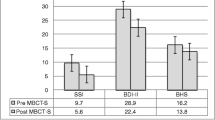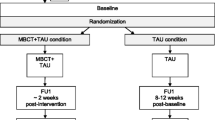Abstract
Suicidality is a major health problem worldwide with lifetime prevalence of suicide ideation of up to 33 %. Although a strong relation between suicidality and depression has often been found, research investigating the impact of psychotherapy for depression on suicidal ideation and behavior is limited. Thus, further treatment options are needed. Mindfulness-based Cognitive Therapy (MBCT) is a promising treatment approach for preventing recurrent suicidal ideation and behavior. MBCT can be applied to patients with suicidality mostly without special modifications, although some authors suggest putting greater emphasis on patterns of thoughts and feelings that might be associated with suicidal planning, factors that maintain and exacerbate such patterns, and preparation of explicit action plans for suicidal crisis (e.g., safety plan intervention). These issues can be addressed during the entire program when appropriate and might be explicitly deepened in session 6 and 7. Proposed mechanisms of change are reduction of experiential avoidance, change in overgeneral memory, reduction of thought suppression, or fostering of self-compassion. Recent research suggests that MBCT for suicidal ideation and behavior is safe and feasible, although for patients suffering from acute and severe suicidality a psychotherapeutic approach based solely on mindfulness would not be recommended. MBCT for suicidality has been shown to reduce suicidal ideation in patients with chronic depression or residual depressive symptoms. This reduction of suicidality was independent from the impact of changes in depression, rumination, mindfulness skills, and interpersonal problems.
Access this chapter
Tax calculation will be finalised at checkout
Purchases are for personal use only
Similar content being viewed by others
References
Clark DM, Wells A. A cognitive model of social phobia. In: Heimberg RG, Liebowitz MR, Hope DA, Schneier FR, editors. Social phobia: diagnosis, assessment, and treatment. New York, NY: Guilford Press; 1995. p. 41–68.
WHO. Preventing suicide: a global imperative. Geneva: WHO Press; 2014.
Nock MK, Borges G, Ono Y. Suicide: Global perspectives from the WHO Worlds Mental Health Surveys. Cambridge: Cambridge University Press; 2014.
Gibb S, Beautrais A, Fergusson D. Mortality and further suicidal behavior after an index suicide attempt: a 10-year study. Aust N Z J Psychiatry. 2005;39:95–100.
Arsenault-Lapierre G, Kim C, Turecki G. Psychiatric diagnoses in 3275 suicides: a meta-analysis. BMC Psychiatry. 2004;4:37.
Angst J, Angst F, Gerber-Werder R, Gamma A. Suicide in 406 mood-disorder patients with and without long-term medications: a 40 to 44 years’ follow-up. Arch Suicide Res. 2005;9:279–300.
Bostwick J, Pankratz S. Affective disorders and suicide risk: a reexamination. Am J Psychiatry. 2000;157:1925–32.
Blair-West G, Mellsop G, Eyeson-Annan M. Down-rating lifetime suicide risk in major depression. Acta Psychiatr Scand. 1997;95:259–63.
Bernal M, Haro JM, Bernert S, Brugha T, de Graaf R, Bruffaerts R, et al. Risk factors for suicidality in Europe: results from the ESEMED study. J Affect Disord. 2007;101:27–34.
Cuijpers P, de Beurs DP, van Spijker BA, Berking M, Andersson G, Kerkhof AJ. The effects of psychotherapy for adult depression on suicidality and hopelessness: a systematic review and meta-analysis. J Affect Disord. 2013;144:183–90.
Williams JM, Duggan DS, Crane C, Fennell MJ. Mindfulness-based cognitive therapy for prevention of recurrence of suicidal behavior. J Clin Psychol. 2006;62(2):201–10.
Williams JM, Crane C, Barnhofer T, Duggan D. Psychology and suicidal behavior: elaborating the entrapment model. In: Hawton K, editor. Prevention and treatment of suicidal behavior. Oxford: Oxford University Press; 2005. p. 71–89.
Williams JM, Crane C, Barnhofer T, Van der Does AJW, Segal ZS. Recurrence of suicidal ideation across depressive episodes. J Affect Disord. 2006;91:189–94.
Williams JM, Van der Does AJW, Barnhofer T, Crane C, Segal ZS. Cognitive reactivity, suicidal ideation and future fluency: preliminary investigation of a differential activation theory of hopelessness/suicidality. Cogn Ther Res. 2008;32:83–104.
Lau MA, Segal ZS, Williams JM. Teasdales’s differential activation hypothesis: implications for mechanisms of depressive relapse and suicidal behaviour. Behav Res Ther. 2004;42:1001–17.
Teasdale JD. Cognitive vulnerability to persistent depression. Cogn Emot. 1998;2:247–74.
Ehring T, Zetsche U, Weidacker K, Wahl K, Schönefeld S, Ehlers A. The Perseverative Thinking Questionnaire (PTQ): validation of a content-independent measure of repetitive negative thinking. J Behav Ther Exp Psychiatry. 2011;42:225–32.
Nolen-Hoeksema S, Wisco BE, Lyubomirsky S. Rethinking rumination. Perspect Psychol Sci. 2008;3:400–24.
Kerkhof A, van Spijker BA. Worrying and rumination as proximal risk factors for suicidal behavior. In: O'Connor R, Platt S, Gordon J, editors. International Handbook of Suicide Prevention: Research, Policy and Practice. Oxford: John Wiley Sons, Ltd.; 2011. p. 199–209.
Morrison R, O'Connor RC. A systematic review of the relationship between rumination and suicidality. Suicide Life Threat Behav. 2008;38:523–38.
Teismann T, Forkmann T. Rumination, entrapment and suicide ideation: a mediational model. Clin Psychol Psychother. 2015. doi: 10.1002/cpp.1999. [Epub ahead of print].
Williams JM, Swales M. The use of mindfulness-based approaches for suicidal patients. Arch Suicide Res. 2004;8:315–29.
Williams JM, Barnhofer T, Crane C, Beck AT. Problem solving deteriorates following mood challenge in formerly depressed patients with a history of suicidal ideation. J Abnorm Psychol. 2005;114:421–31.
Williams JM, Crane C, Barnhofer T, Brennan K, Duggan DS, Fennell MJ, et al. Mindfulness-based cognitive therapy for preventing relapse in recurrent depression: a randomized dismantling trial. J Consult Clin Psychol. 2014;82(2):275–86.
Barnhofer T, Crane C, Hargus E, Amarasinghe M, Winder R, Williams J. Mindfulness-based cognitive therapy as a treatment for chronic depression: a preliminary study. Behav Res Ther. 2009;47:366–73.
Chesin MS, Chaudhury S, Stanley B. Psychotherapeutic treatment approaches for suicidal individuals. In: Cannon KE, Hudzik TJ, editors. Suicide: phenomenology and neurobiology. Heidelberg: Springer; 2014. p. 223–36.
Stanley B, Brown GK. Safety planning intervention: a brief intervention to mitigate suicide risk. Cogn Behav Pract. 2012;19(2):256–64.
Chesin MS, Sonmez CC, Benjamin-Phillips CA, Beeler B, Brodsky BS, Stanley B. Preliminary effectiveness of adjunct mindfulness-based cognitive therapy to prevent suicidal behavior in outpatients who are at elevated suicide risk. Mindfulness. 2015;6(6):1345–55. doi:10.1007/s12671-015-0405-8.
Kenny MA, Williams JM. Treatment-resistant depressed patients show a good response to mindfulness-based cognitive therapy. Behav Res Ther. 2007;45(3):617–25.
Crane C, Barnhofer T, Duggan DS, Hepburn S, Fennell MV, Williams JMG. Mindfulness-based cognitive therapy and self-discrepancy in recovered depressed patients with a history of depression and suicidality. Cogn Ther Res. 2008;32(6):775–87.
Segal ZV, Williams JMG, Teasdale JD. Mindfulness-based cognitive therapy for depression: a new approach to preventing relapse. New York: Guilford; 2002.
Geschwind N, Peeters F, Huibers M, van Os J, Wichers M. Efficacy of mindfulness-based cognitive therapy in relation to prior history of depression: randomised controlled trial. Br J Psychiatry. 2012;201:320–5.
Michalak J, Schultze M, Heidenreich T, Schramm E. A randomized controlled trial on the efficacy of mindfulness-based cognitive therapy and a group version of cognitive behavioral analysis system of psychotherapy for chronically depressed patients. J Consult Clin Psychol. 2015;83(5):951–63.
Forkmann T, Wichers M, Geschwind N, Peeters F, Van OJ, Mainz V, et al. Effects of mindfulness-based cognitive therapy on self-reported suicidal ideation: results from a randomised controlled trial in patients with residual depressive symptoms. Compr Psychiatry. 2014;55(8):1883–90.
Forkmann T, Brakemeier E-L, Teismann T, Schramm E, Michalak J. The effects of mindfulness-based cognitive therapy and cognitive-behavioral analysis system of psychotherapy on suicidal ideation in chronic depression. J Affect Disord. in press, doi:10.1016/j.jad.2016.01.047.
Hamilton M. Development of a rating scale for primary depressive illness. Br J Soc Clin Psychol. 1967;6(4):278–96.
Britton WB, Lepp NE, Niles HF, Rocha T, Fisher NE, Gold JS. A randomized controlled pilot trial of classroom-based mindfulness meditation compared to an active control condition in sixth-grade children. J Sch Psychol. 2014;52(3):263–78.
Luoma JB, Villatte JL. Mindfulness in the treatment of suicidal individuals. Cogn Behav Pract. 2012;19(2):265–76.
Hayes SC, Wilson KG, Gifford EV, Follette VM, Strosahl K. Experimental avoidance and behavioral disorders: a functional dimensional approach to diagnosis and treatment. J Consult Clin Psychol. 1996;64(6):1152–68.
Hayes SC, Luoma JB, Bond FW, Masuda A, Lillis J. Acceptance and commitment therapy: model, processes and outcomes. Behav Res Ther. 2006;44(1):1–25.
Williams J, Teasdale J, Segal Z, Soulsby J. Mindfulness-based cognitive therapy reduces overgeneral autobiographical memory in formerly depressed patients. J Abnorm Psychol. 2000;109(1):150–5.
Pettit JW, Temple SR, Norton PJ, Yaroslavsky I, Grover KE, Morgan ST, et al. Thought suppression and suicidal ideation: preliminary evidence in support of a robust association. Depress Anxiety. 2009;26(8):758–63.
Hepburn SR, Crane C, Barnhofer T, Duggan DS, Fennell MJ, Williams JM. Mindfulness-based cognitive therapy may reduce thought suppression in previously suicidal participants: findings from a preliminary study. Br J Clin Psychol. 2009;48(Pt 2):209–15.
Tucker RP, O'Keefe VM, Cole AB, Rhoades-Kerswill S, Hollingsworth DW, Helle AC, et al. Mindfulness tempers the impact of personality on suicidal ideation. Pers Individ Dif. 2014;68:229–33.
Neff KD. The development and validation of a scale to measure self-compassion. Self Identity. 2003;2:223–50.
Kuyken W, Watkins E, Holden E, White K, Taylor RS, Byford S, et al. How does mindfulness-based cognitive therapy work? Behav Res Ther. 2010;48:1105–12.
Author information
Authors and Affiliations
Corresponding author
Editor information
Editors and Affiliations
Rights and permissions
Copyright information
© 2016 Springer International Publishing Switzerland
About this chapter
Cite this chapter
Forkmann, T., Teismann, T., Michalak, J. (2016). Mindfulness-Based Cognitive Therapy for Patients with Suicidal Ideation and Behavior. In: Eisendrath, S. (eds) Mindfulness-Based Cognitive Therapy. Springer, Cham. https://doi.org/10.1007/978-3-319-29866-5_16
Download citation
DOI: https://doi.org/10.1007/978-3-319-29866-5_16
Published:
Publisher Name: Springer, Cham
Print ISBN: 978-3-319-29864-1
Online ISBN: 978-3-319-29866-5
eBook Packages: MedicineMedicine (R0)




